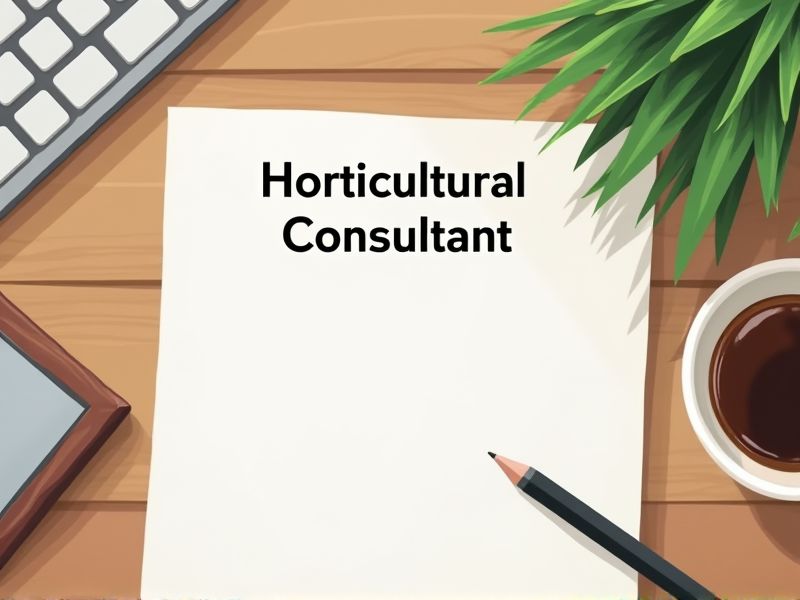
Horticultural consultants play a critical role in advising clients on plant health, pest management, and sustainable practices. Certifications ensure they possess up-to-date knowledge and expertise to address diverse agricultural challenges effectively. A certified consultant is often more trusted by clients, enhancing credibility and expanding professional opportunities. Here are some essential certifications you may need as a Horticultural Consultant.
Certified Professional Horticulturist (CPH)
Certified Professional Horticulturists (CPH) possess advanced knowledge and skills, ensuring that horticultural consulting advice is scientifically sound and effective. Their certification signifies a validated expertise, which enhances trust and credibility with clients seeking professional guidance. The CPH credential ensures that the consultant stays updated with industry standards and emerging trends, essential for addressing complex horticultural challenges. Hiring a CPH can lead to improved plant health, increased crop yields, and sustainable practices, directly benefiting agricultural businesses and landscapes.
Certified Landscape Professional (CLP)
Certified Landscape Professionals (CLP) possess specialized knowledge, ensuring they can provide expert guidance and innovative solutions for horticultural challenges. Training for CLP credentials emphasizes best practices in sustainability, crucial for environmentally conscious landscape design. Having a CLP enhances credibility with clients, often translating to increased trust and business opportunities in the competitive horticultural consulting field. Certification supports continued learning, helping consultants stay updated on the latest industry trends and technologies.
Pesticide Applicator Certification
Pesticide Applicator Certification ensures horticultural consultants possess essential knowledge to safely and effectively apply chemical treatments. It reduces the risk of harm to the environment, non-target species, and human health by ensuring proper handling and usage practices. The certification aligns with legal and regulatory standards, preventing potential legal repercussions for improper pesticide use. This certification enhances the consultant's credibility and trustworthiness, influencing clients' confidence in their professional services.
Certified Irrigation Specialist (CIS)
Horticultural consultants benefit from engaging a Certified Irrigation Specialist because specialized knowledge ensures water resources are efficiently utilized, leading to healthier plant growth. Expertise in irrigation systems can reduce waste and environmental impact, aligning with sustainable practices. Accurate water management by a CIS can result in cost savings for clients, enhancing the consultant's value proposition. Their certification validates a high standard of competence and credibility, attracting discerning clientele.
Organic Farming Certification
Organic farming certification provides horticultural consultants with a validated framework, aligning their practices with environmentally sustainable standards. This certification facilitates consumer trust, ensuring that advised practices meet health and safety expectations. With certification, consultants gain access to specific markets demanding organic produce, enhancing business opportunities. Certification ensures compliance with legal and industry regulations, minimizing risk of penalties or market exclusion.
Sustainable Landscape Management Certification
A horticultural consultant with a Sustainable Landscape Management Certification can reduce environmental impact by promoting eco-friendly practices. The certification ensures adherence to sustainable principles, which increases a consultant's credibility and trust with environmentally conscious clients. Sustainable landscape management addresses issues such as resource conservation and biodiversity, helping consultants provide more holistic solutions. As ecological concerns rise, demand for certified professionals in sustainable practices grows, enhancing career opportunities in the horticultural sector.
Soil Science Certification
Soil science certification equips horticultural consultants with a deeper understanding of soil properties and their impact on plant health. This knowledge enables accurate soil assessments, leading to better recommendations for plant selection and care. Without proper soil analysis, consultants may overlook crucial factors like nutrient deficiencies or soil pH, which can hinder plant growth. Certification also establishes credibility, assuring clients of the consultant's expertise in soil-related issues.
Integrated Pest Management (IPM) Certification
Integrated Pest Management (IPM) Certification is vital for a horticultural consultant because it provides them with essential knowledge and strategies to effectively manage pest issues using environmentally friendly methods. By obtaining this certification, consultants demonstrate their commitment to sustainable practices, which can attract clients seeking eco-conscious solutions. The certification equips them to offer scientifically-backed advice, enhancing their credibility in the horticulture industry. As pest challenges grow due to changing climates, IPM-certified consultants are better prepared to devise adaptive solutions, meeting both client needs and environmental standards.
Green Roof Professional Certification
The Green Roof Professional Certification equips horticultural consultants with specialized knowledge to design and maintain green roof ecosystems effectively. This certification ensures they understand the unique plant requirements and environmental conditions necessary for thriving green roofs, minimizing maintenance costs and maximizing sustainability. Cities increasingly prioritize green infrastructure, so certified consultants are more competitive and meet regulatory demands. The certification helps minimize environmental impact while enhancing urban biodiversity and stormwater management solutions.
Environmental Management Systems (EMS) Certification
Achieving EMS certification can enhance a horticultural consultant's credibility by demonstrating a commitment to sustainable and environmentally responsible practices. This certification can lead to improved resource efficiency, which reduces operational costs due to optimized water and energy use. Clients often seek consultants with proven sustainability credentials, making EMS certification a potential driver for increased business opportunities. EMS certification aids in compliance with environmental laws and regulations, minimizing the risk of legal penalties or fines for clients and consultants alike.
Summary
By obtaining certifications, you will likely enhance your credibility as a Horticultural Consultant. This increased trust can lead to attracting more clients or securing better positions. Your expertise will be formally recognized, which may allow for higher fee opportunities. Certification can also open access to specialized knowledge and networks that can elevate your practice.
